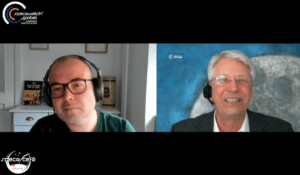 In this Space Cafe German edition, Andreas Schepers talked to ESA’s international agencies coordinator and former ESA Astronaut and director of human spaceflight, Thomas Reiter about the past, present and future of human spaceflight.
In this Space Cafe German edition, Andreas Schepers talked to ESA’s international agencies coordinator and former ESA Astronaut and director of human spaceflight, Thomas Reiter about the past, present and future of human spaceflight.
Thomas Reiter delivered a vivid report on his two spaceflights: Euromir 95 (1995) to the Russian space station MIR and Expedition 13/14 to the International Spacestation ISS. With regards to current discussions on the imminent future of the ISS, Reiter expressed optimism that the ISS will be operated beyond 2024.
Asked about a Chinese-European cooperation in the domain of human spaceflight, Thomas Reiter referred to the fact that some European astronauts learned Chinese and that there already is scientific cooperation between the two organisations. Mr Reiter didn’t want to exclude the possibility to see a European astronaut flying to the Chinese space station, which is currently being built.
Thomas Reiter also underlined Europe’s important role in NASA’s Artemis programme. Europe not only provides the service module of the Orion spacecraft but will also provide some key elements of the planned lunar gateway. In this context, Reiter mentioned that three flight opportunities to the lunar gateway are already foreseen for European astronauts.
This Space Café Germany, held on 6 Mai 2021, was hosted by Andreas Schepers, a friend of SpaceWatch.Global.
SpaceWatch.Global is a Switzerland-based digital magazine and portal for those interested in space and the far-reaching impact of the space sector.
To listen to the insights of this Space Café, you can watch the full program here:
To subscribe and get the latest on the space industry from world-leading experts visit – click here.
GERMAN VERSION:
Space Café Germany Rückblick: Thomas Reiter über die Vergangenheit, Gegenwart und Zukunft der astronautischen Raumfahrt
Andreas Schepers sprach mit dem Koordinator der internationalen Agenturen der ESA und ehemaligen ESA-Astronauten und Direktor für astronautische Raumfahrt, Thomas Reiter, über Vergangenheit, Gegenwart und Zukunft der astronautischen Raumfahrt.
Thomas Reiter lieferte einen anschaulichen Bericht über seine beiden Raumflüge: Euromir 95 (1995) zur russischen Raumstation MIR und Expedition 13/14 zur internationalen Raumstation ISS.
Im Hinblick auf die aktuellen Diskussionen über die bevorstehende Zukunft der ISS zeigte sich Reiter optimistisch, dass die ISS über das Jahr 2024 hinaus betrieben wird.
Angesprochen auf eine chinesisch-europäische Kooperation im Bereich der astronautischen Raumfahrt verwies Thomas Reiter auf die Tatsache, dass einige europäische Astronauten Chinesisch gelernt haben und dass es bereits eine wissenschaftliche Zusammenarbeit zwischen beiden Organisationen gibt. Herr Reiter wollte nicht ausschließen, dass ein europäischer Astronaut zur chinesischen Raumstation fliegt, die derzeit gebaut wird.
Thomas Reiter betonte auch die wichtige Rolle Europas im Artemis-Programm der NASA. Europa steuert nicht nur das Servicemodul des Orion-Raumschiffs bei, sondern wird auch einige Schlüsselelemente des geplanten Mond-Gateways beisteuern. In diesem Zusammenhang erwähnte Reiter, dass für europäische Austronauten bereits drei Fluggelegenheiten zum Mondgateway vorgesehen sind.
Das Space Café Germany, das am 6. Mai 2021 stattfand, wurde von Andreas Schepers, Freund von SpaceWatch.Global, moderiert.
SpaceWatch.Global ist ein in der Schweiz ansässiges digitales Magazin und Portal für alle, die sich für den Weltraum und die weitreichenden Auswirkungen des Raumfahrtsektors interessieren.





